Risque
Le rapport « La situation mondiale des transferts monétaires » du CaLP Network indique que l’idée selon laquelle les transferts monétaires seraient plus risqués que d’autres formes d’aide est l’une des barrières principales à l’utilisation fréquente de cette modalité. Ces craintes sont liées à l’insistance de plus en plus franche des bailleurs concernant la lutte contre le terrorisme et contre le blanchiment d’argent, et à l’amenuisement des budgets destinés à l’assistance humanitaire. Le travail du CALP Network sur cette problématique vise à combattre les idées reçues, à faciliter la collaboration et à partager les apprentissages afin de veiller à ce que les transferts monétaires soient systématiquement considérés, tout comme d’autres modalités, en fonction des données probantes disponibles sur les risques réels de toutes les modalités.
Priorités actuelles
Plusieurs organisations travaillent actuellement sur les risques entraînés par les transferts monétaires. Le CALP Network cherche à identifier les synergies entre acteurs, à éviter les duplications et à définir des priorités communes sur lesquelles nous pourrions agir plus efficacement en groupe. Avec le PAM, le CALP Network co-dirige l’élément Risques, priorité du chantier du Grand Bargain sur les transferts monétaires.
Contenu présenté
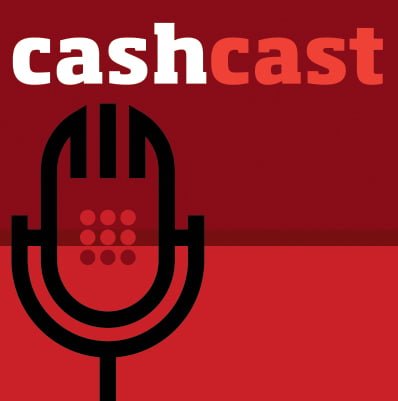
Podcast: Will risk aversion hold us back from realizing the potential of CVA?
Podcast
Episode 1 of the CashCast, exploring how attitudes to risk have impacted the use of CVA in the Middle East and North Africa region.

Transferts monétaires et risques : ce qui se passe sur le terrain, reste sur le terrain (et pourquoi c’est un problème)
Blog Post
En octobre 2019, le CALP Network a facilité à Douala, au Cameroun, une réunion de partage d’expériences sur les risques liés à la protection des bénéficiaires dans les interventions monétaires. Cette réunion restreinte, organisée dans le cadre d’une série de rencontres dans différentes régions, a permis à 25 travailleurs humanitaires d’Afrique de l’Ouest et du Centre,...

Webinar: Data sharing in CVA: ethics, ownership and privacy
Event
Thematic lead
Contenu récent
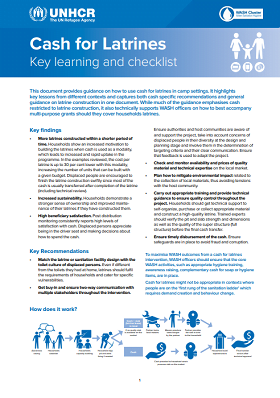
Cash for Latrines
Guidelines and Tools
This document provides guidance on how to use cash for latrines in camp settings. It highlights key lessons from different contexts and captures both cash specific recommendations and general guidance on latrine construction in one document.

Harmonising registrations and identification in emergencies in Somalia
Report
The study reveals that the collection of registration and identification data in Somalia is governed mainly by policies, guidelines and standard operating procedures developed by humanitarian agencies. Before collecting registration data, most humanitarian agencies select recipients through a two-step...

Guide sur la sauvegarde des enfants dans les programmes de transferts monétaires
Guides et outils
L’objectif de ce guide est d’identifier les risques potentiels liés à la sauvegarde des enfants des les programmes de transferts monétaires et de fournir des suggestions sur la manière de les gérer (y compris le suivi et l’atténuation), afin que les enfants connaissent la plus grande...
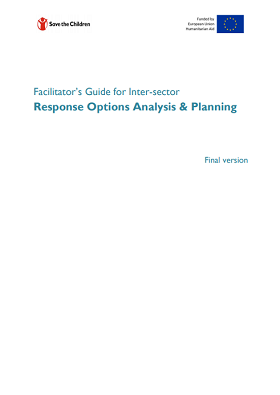
Response Options Analysis Planning Guide
Guidelines and Tools
The inter-sector Response Options Analysis and Planning (ROAP) is a structured decision-making process, which draws from the information generated through a multitude of needs and operational environment assessments. The ROAP gives way to the selection of the most appropriate, operationally feasible and...

Harmonising registrations and identification in emergencies in Somalia – Briefing
Report
This briefing highlights the benefits, risks and challenges associated with establishing an integrated data system for cash transfer programming (CTP), based on the findings of a study that examined how different humanitarian agencies in Somalia are managing the collection, analysis and sharing of...

Feasibility Study on Cash Transfer Programming for the Returnees and the Host Communities in Gedeo and West Guji in Ethiopia
Report
This document reveals the outcome of a feasibility study on cash transfer programming targeted for the returnees and the host communities in Gedeo and West Guji Zones.
The major objectives of the study were as follows:
1. Understand general cash transfer environment in Ethiopia
2. Validate the needs of...

Analyse des dynamiques sociales et des pouvoirs des parties prenantes pour la mise en place de Transferts Monétaires à Usage Multiple (TMUM) pluriannuels au Nord Mali
Rapport
Six ONG internationales (Action contre la Faim, Danish Refugee Council, Handicap International, International Rescue Committee, Oxfam et Solidarités International) ont mis en place un programme de transferts monétaires à usage multiple au Mali ; la deuxième phase de cette intervention de filets...

Mitigating Risks of Abuse of Power in Cash Assistance in Cameroon
Report
This document outlines lessons learned from a joint UNHCR/WFP project in Cameroon with the aim to, with Financial Service Providers (FSPs), identify and mitigate the risks of abuse of power in cash assistance, including through mobile money, e-vouchers and cash in hand.
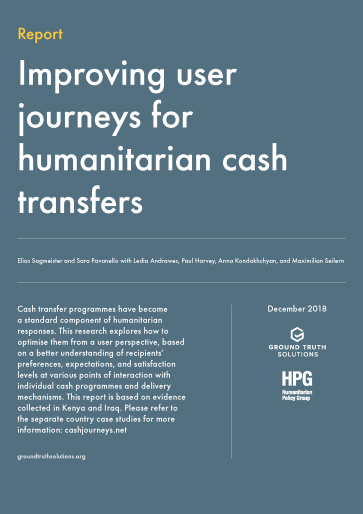
Improving user journeys for humanitarian cash transfers
Report
Humanitarian agencies are increasingly using digital payments, such as mobile money, pre-paid or smartcards, bank cards and electronic vouchers, to deliver cash assistance to affected populations. At the same time, the analysis and use of payment technologies have become more important, as have...

Mitigating Risks of Abuse of Power in Cash Assistance – Workshop Nairobi, Kenya
Report
UNHCR and WFP are implementing a joint project to identify and mitigate risks of abuse of power by private sector service providers in the delivery
of cash assistance to vulnerable populations. The workshop, held in Nairobi on 10-11 December 2018, followed visits to the first two pilot countries,...

Cash Week 2018: Looking around and looking ahead
Blog Post
Cash Week 2018 aimed to do two things: challenge us all to think differently about our work and to carve out a space to do so. In this blog, the CALP Network's Sophie Tholstrup reflects on the key debates from the week, and asks how we can build on this momentum and identify new ways of working to meet...

Mitigating Risks of Abuse of Power in the Democratic Republic of Congo
Case Study
This document outlines lessons learned from a joint UNHCR/WFP project in the Democratic Republic of Congo (DRC) with the aim to, with Financial Service Providers (FSPs), identify and mitigate the risks of abuse of power in cash assistance, including through cash in hand, pre-paid cards and mobile money.

Mitigating Risks Of Abuse Of Power In Cash Assistance In The Democratic Republic Of Congo
Report
This document outlines lessons learned from a joint UNHCR/WFP project in the Democratic Republic of Congo (DRC) with the aim to, with Financial Service Providers (FSPs), identify and mitigate the risks of abuse of power in cash assistance, including through cash in hand, pre-paid cards and mobile money.

Enseignements et Recommandations pour la programmation en transferts monétaires dans les interventions abri en RDC
Rapport
Ce document donne un aperçu de l’utilisation des transferts monétaires par les partenaires du Groupe du Travail Abris (GTA) en RDC et détaille les leçons apprises à ce jour. Il présente ensuite des recommandations et des possibilités de renforcer la programmation des transferts monétaires et les...

Need and greed: corruption risks, perceptions and prevention in humanitarian assistance
Report
Emergency environments present unique corruption risks for agencies operating within them. Relief is delivered amidst weak or absent rule of law, endemic corruption and immense need. The capacities of governments and humanitarian agencies to assist affected people are stretched to the limit, and agencies...
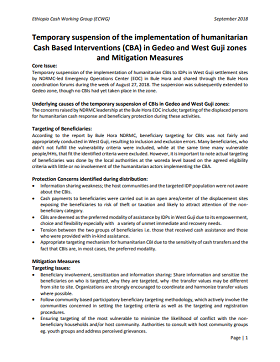
Temporary suspension of the implementation of humanitarian Cash Based Interventions (CBA) in Gedeo and West Guji zones and Mitigation Measures
Report
Temporary suspension of the implementation of humanitarian CBIs to IDPs in West Guji settlement sites by NDRMC-led Emergency Operations Center (EOC) in Bule Hora and shared through the Bule Hora coordination forums during the week of August 27, 2018. The suspension was subsequently extended to Gedeo zone,...
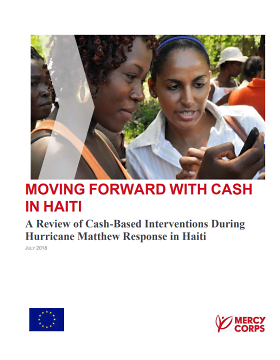
Moving Forward with Cash in Haiti: A Review of Cash-Based Interventions during Hurricane Matthew Response in Haiti
Case Study
Mercy Corps, with funding from European Civil Protection and Humanitarian Aid Operations (ECHO) has conducted an extensive review of lessons learned and contextual data, combined with key informant interviews and workshops to compile, analyse and present core lessons from the Hurricane Matthew cash-based...

The Grand Bargain Cash Meetings: what did we learn, how are we doing, where next?
Blog Post
After cash focal points from Grand Bargain signatory organisations gathered in Rome for the second annual meeting of the Grand Bargain cash workstream, we ask how much progress has been made towards commitments, and what remains to be done.
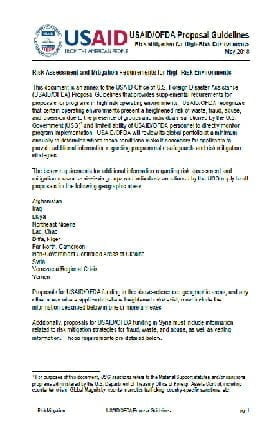
Risk Assessment and Mitigation Requirements for High-Risk Environments
Guidelines and Tools
This document is an annex to the USAID Office of U.S. Foreign Disaster Assistance (USAID/OFDA) Proposal Guidelines that provides supplemental requirements for proposals for programs in high-risk operating environments. USAID/OFDA recognizes that certain operating environments present a heightened risk of...

The Signal Code: Ethical obligations for humanitarian information activities
Guidelines and Tools
Humanitarians today lack sufficient ethical guidance adapted to the realities of humanitarianism in the information age to responsibly navigate the challenges and realities of the digital age. The Signal Code: Ethical Obligations for Humanitarian Information Activities translates and applies the...



